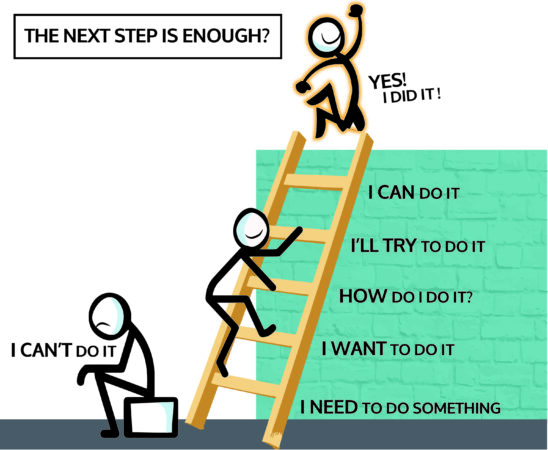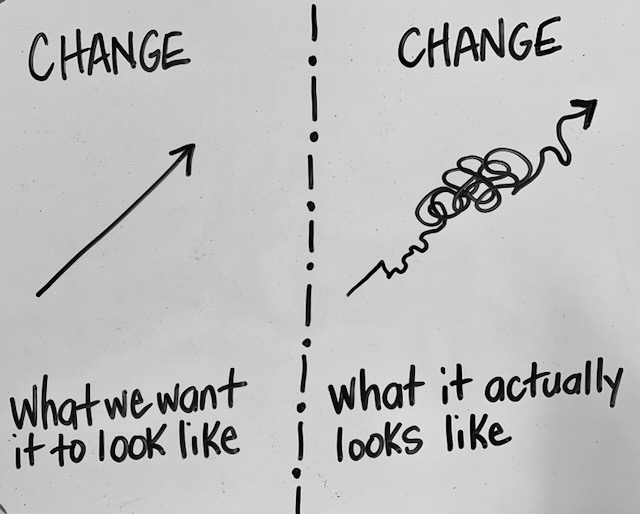Ready for Coaching?
Will coaching still be useful if a student is resistant?
Even when it is clear to parents and teachers that a student is struggling with Executive Functioning, it is very common for students to not acknowledge their challenges and resist the idea of coaching.
Students who struggle in school often attribute their lack of success to external forces that are out of their control (e.g. the content is too challenging, the instruction doesn’t match my learning style, school is boring). This perception can leave them feeling like they aren’t smart and that no matter what they do they are going to fail. In an effort to protect themselves, they may appear not to care about school, shut down or just stop trying.
The Stages of Change can be used to better understand whether a student is ready for change and how to support them to move to the next stage. The Stages of Change Model was devised by Prochaska and DiClemente (1982) and suggests that there are five stages of behaviour change:

Precontemplation – not thinking about changing
I CAN’T/DON’T WANT TO DO IT
Contemplation – beginning to think about change
I WANT TO DO IT
Preparation – making small changes
HOW DO I DO IT?
Action – undertaking the new behavior
I’LL TRY TO DO IT
Maintenance – the new behaviour becomes a habit
I CAN DO IT!
To better understand how important the process of change is, it might be helpful to consider a change you have made in your own life and think about the signs you noticed that indicated when you were ready to move to the next stage.
For example, for a long time, I resisted meditation because my mind seemed too busy to even imagine sitting quietly (precontemplation). Eventually, I knew I needed a tool to help me slow down so I started exploring different mediation apps (contemplation). I decided I liked the style and voice of the person leading the mediation on the Headspace app (preparation). I started a daily mediation practice for 10-minutes a day (action). That was 5 years ago and it has become such an important part of my daily routine that I almost never miss my morning mediation (maintenance)!
That is how you go from where you are today to where you want to be… it’s a series of small actions you take over and over again that ultimately leads to change. Having an awareness of where you are in this process and what you need to do next is incredibly helpful.
Change isn’t linear
It is also helpful to note that change isn’t linear. The path to change is a rocky one with lots of peaks, dips and messiness. It’s all part of how we get from where we are now to where we want to be. The struggles we encounter along the path to change are just as important as our successes to our overall growth. Notice in the image below that even though there are ups and downs, ultimately once we decide to grow and change, we continue to move forward. We don’t lose the things we learn along the way, we just build.

When is a student ready for coaching?
For coaching to work, students themselves have to recognize they are struggling with at least some aspect of learning and have a desire to explore options for help. It is important that the student is on board with wanting to participate in coaching because they will be required to take an active role in the process with the support of the coach.
If they are open to change but don’t know how to do it, they can begin by learning about the stages of change so they are aware of how change happens and consider what it might take to shift their thinking, feelings and actions. After acknowledging how hard it is to change and explaining that it is a process, I encourage students to take a small step and experiment with trying something new. This type of incremental approach is often helpful in creating lasting and meaningful change.
If a learner is not yet committed to wanting to change, spending time building their metacognitive awareness (the awareness of one’s own learning and thinking) might be recommended. This process will provide them with an opportunity to explore what executive functioning is, their unique strengths and challenges as a learner along with the impact of mindset on their learning. With self-awareness and an appreciation for the role of failure in learning, students can turn negative self-perceptions around and begin to see themselves as capable.
For online coaching to be effective, students in the contemplation (I want to do it) or preparation stages (how do I do it) are the best candidates for coaching.
Reference:
Prochaska, J., & Di Clemente, C. (1982). Transtheoretical therapy: Toward a more integrative model of change. Psychotherapy: Theory, Research and Practice, 19(3), 276-88. doi: 10.1037/h0088437
